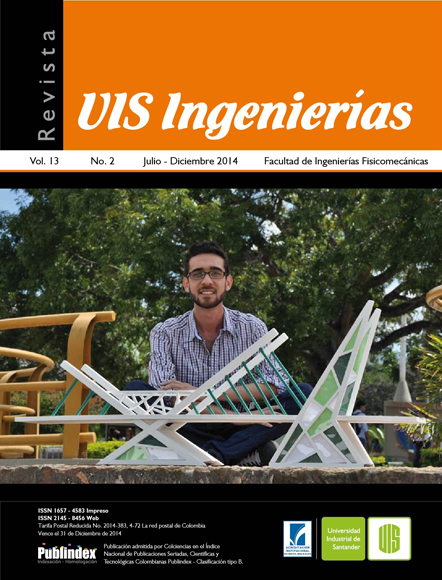Artículos
Publicado 2014-06-12
Palabras clave
- Gestión de la cooperación,
- dilemas sociales a gran escala,
- mecanismos,
- confianza,
- dependencia de las condiciones iniciales
Cómo citar
Parra-Valencia, J. A., Dyner-Rezonzew, I., Serrano, M. C., Pineda-Ballesteros, E., & Lizcano-Dallos, A. R. (2014). Evaluando la posibilidad de gestionar la cooperación en la crisis del CO2 a través de mecanismos para enfrentar la dependencia de las condiciones iniciales de confanza usando un modelo de simulación. Revista UIS Ingenierías, 13(2), 7–28. Recuperado a partir de https://revistas.uis.edu.co/index.php/revistauisingenierias/article/view/7-28
Resumen
Los mecanismos de cooperación, basados en confanza, presentan dependencia de sus condiciones iniciales. Se ha probado que es posible promover y mantener la cooperación a través de la combinación de mecanismos usando un modelo de simulación sobre la crisis del CO2. Los resultados sugieren que la cooperación puede ser promovida y sustentada con la combinación de estos mecanismos. Los experimentos de simulación ofrecen soporte a la hipótesis de que es posible administrar la cooperación en dilemas sociales de gran escala incluso si las condiciones iniciales de confanza no son sufcientes para esperar altos niveles de acción colectiva.
Descargas
Los datos de descargas todavía no están disponibles.
Referencias
- OSTROM, E; WALKER, J. Trust and reciprocity: Interdisciplinary lessons from experimental research. Russell Sage Foundation Publications. 2005.
- OSTROM, Elinor. et al. The drama of the commons. National Research Council. 2002.
- OSTROM, E. A behavioral approach to the rational choice theory of collective action. In Polycentric games and institutions: readings from the Workshop in Political Theory and Policy Analysis, (pp. 472). University of Michigan Press. 2000.
- OSTROM, Elinor., et al. Rules, games, and commonpool resources. University of Michigan Press. 1994.
- OSTROM, E. et al. What do people bring into the game? Experiments in the field about cooperation in the commons. Agricultural Systems, 82(3), 307–326. 2004.
- CASTILLO, D; SAYSEL, A. Simulation of common pool resource field experiments: a behavioral model of collective action. Ecological Economics, 55(3), 420– 436. 2005.
- McGINNIS, M; OSTROM, E. Will Lessons from SmallScale Social Dilemmas Scale Up? New issues and paradigms in research on social dilemmas. Berlin: Springer. 189–211. 2008.
- BIEL, A. et al. Norm perception and cooperation in large scale social dilemmas. Resolving social dilemmas: Dynamic, structural, and intergroup aspects. Psychology Press. 245–252. 1999. Intergovernmental Panel on Climate Change-IPCC. Climate Change 2007: Synthesis Report. Ipcc, UN. 2007.
- BUCK, S. The global commons: an introduction. Island Press. 1998.
- STERMAN, J; SWEENEY, L. Cloudy skies: assessing public understanding of global warming. System Dynamics Review, 18(2), 207–240. 2002.
- TANS, P. Data carbon dioxide measured at Manua Loa Observatory, Hawaii. Earth System Research Laboratory. [web en línea]. < www.esrl.noaa.gov/gmd/ccgg/ trends >. [Consulta: 10-7-2013] 2010.
- STERMAN, J. Business dynamics: Systems thinking and modeling for a complex world. Irwin/McGraw-Hill. 2000.
- FORRESTER, J. Industrial Dynamics. MIT press Cambridge, MA. 1961.
- ELSTER, J. Nuts and bolts for the social sciences. Cambridge University Press. 1989.
- MASKIN, E. Mechanism design: How to implement social goals. American Economic Review, 98(3), 567–576.2008.
- SCHELLING, T. The strategy of conflict. Prospectus for a reorientation of game theory. Journal of Conflict Resolution, 2(3), 203. 1958.
- PARRA, J. A. Constructo para la evaluación de la cooperación en dilemas sociales de gran escala. PhD thesis,Universidad Nacional de Colombia. Doctorado en Ingeniería Área Sistemas. 2010.
- MORTHORST, P. The development of a green certificate market. Energy policy, 28(15), 1085–1094. 2000.
- JENSEN, J; RASMUSSEN, T. Allocation of co2 emissions permits: A general equilibrium analysis of policy instruments* 1. Journal of Environmental Economics and Management, 40(2), 111–136. 2000.
- STERMAN, J; SWEENEY, L. Understanding public complacency about climate change: Adults mental models of climate change violate conservation of matter. Climatic Change, 80(3), 213–238. 2007.
- DIEHL, E; STERMAN, J. Effects of feedback complexity on dynamic decision making. Organizational Behavior and Human Decision Processes, 62(2), 198–215. 1995.
- STERMAN, J. Misperceptions of feedback in dynamic decision making. Organizational behavior and Human Decision Processes, 43(3), 301–335. 1989.
- DIEHL, Ernst; STERMAN, John. Effects of feedback complexity on dynamic decision making. Organizational Behavior and Human Decision Processes, 62(2), 198– 215. 1995.
- STERMAN, John. Misperceptions of feedback in dynamic decision making. Organizational behavior and Human Decision Processes, 43(3), 301–335. 1989.

